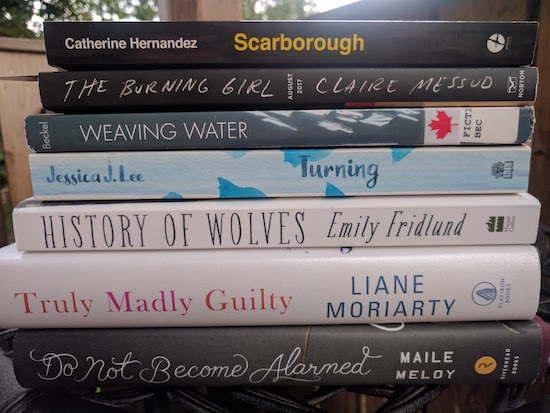August 27, 2017
All Time Record
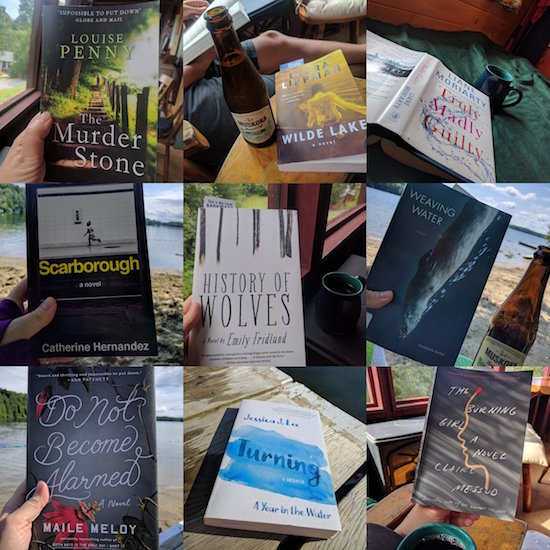
I made a very uncharacteristic vow a few months ago to only bring a couple of books on vacation, and not be so maniacally compelled to be always reading. Because I remember feeling pressure to read on previous vacations, which is stupid for a vacation and also made me anti-social…and then I ended up bringing seven books on vacation, plus a few extras, for Stuart to read and for just-in-case scenarios. But I decided I didn’t have to finish them all during our week at the lake. What better way to retain that holiday feeling than to let the holiday reading continue over into the week we’re back home, I thought. There was no pressure. I was going away with a towering stack, but I didn’t have to read all of them.
But then I did! Without being anti-social, even, because I also swam in the lake, played UNO and charades and Old Maid and Zingo. But on top of this, I lingered in bed in the mornings, read by flashlight at night after everyone was asleep, and got lots of reading in while the children were out chasing frogs, treasure hunting, or partaking in nighttime movies every evening at 7pm in the rec hall. There was time enough for all the reading, but also for all the other things. The days were so perfectly elastic, the way summer days are meant to be.
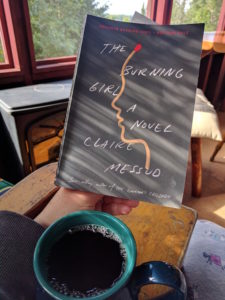 There was no rhyme nor reason to my stack of holiday books, except for the first, which was The Burning Girl, by Claire Messud, because I had to get it read for work reasons. But it turned out to be perfect, because it was such a summer book, steeped in atmosphere and there was a quarry and everything. Such a strange, skewed book too though, like everything Messud writes. It’s a look back on a friendship between two girls which breaks off at the point in which girlhood breaks off into womanhood, and the whole story delivered with this spectacular dose of nostalgia—except the main events of the narrative are just two years before and the narrator is still a teenager. I wasn’t expecting that, and it was kind of disorienting, this idea of the 1990s being something that happened “before I was born.” I’m used to young protagonists being set in the past. It was interesting. And she was such an interesting protagonist too, elusive and tricky in the way of Messud’s from The Women Upstairs. (Remember the furor from that book, about women and likability, and then Jennifer Weiner got involved?) This book is more subtle though, so much so that it needs an additional read to puzzle out its construction. The “Bev Burnes” character continues to haunt me, with her ample backside. And yes, the quarry. It would turn out that nearly all my holiday books would take place around bodies of water. Isn’t it funny the way that a syllabus assumes itself?
There was no rhyme nor reason to my stack of holiday books, except for the first, which was The Burning Girl, by Claire Messud, because I had to get it read for work reasons. But it turned out to be perfect, because it was such a summer book, steeped in atmosphere and there was a quarry and everything. Such a strange, skewed book too though, like everything Messud writes. It’s a look back on a friendship between two girls which breaks off at the point in which girlhood breaks off into womanhood, and the whole story delivered with this spectacular dose of nostalgia—except the main events of the narrative are just two years before and the narrator is still a teenager. I wasn’t expecting that, and it was kind of disorienting, this idea of the 1990s being something that happened “before I was born.” I’m used to young protagonists being set in the past. It was interesting. And she was such an interesting protagonist too, elusive and tricky in the way of Messud’s from The Women Upstairs. (Remember the furor from that book, about women and likability, and then Jennifer Weiner got involved?) This book is more subtle though, so much so that it needs an additional read to puzzle out its construction. The “Bev Burnes” character continues to haunt me, with her ample backside. And yes, the quarry. It would turn out that nearly all my holiday books would take place around bodies of water. Isn’t it funny the way that a syllabus assumes itself?
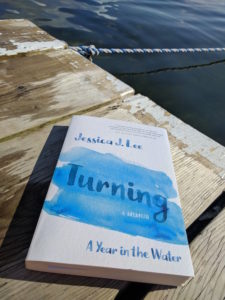 From this point on my reading also became a fun celebration of all the bookshops I’ve been visiting this spring and summer. I picked up Turning, by Jessica J. Lee at Curiosity House Books when we were in Creemore in June, a book I was partial to for #SwimLit reasons and also because of Lindsay’s review at her swimming hole blog. Once again, a book focussed on a body of water, or in this case many of them—although this time I’d seen it coming. The memoir is Lee’s story of her lifelong complicated relationship with swimming and water, and also with notions of identity and home, and about how she got over a bout of heartache and depression by spending a year swimming in lakes near her home in Berlin. A year indeed, which means Lee swims in all kinds of weather, in the deepest winter with a hammer to break the ice, and in the winter she never swims for too long. Although apparently the more you winter swim, your body grows accustomed to lower temperatures—though I’m going to just take her word for it. (I must say that Lee inspired me to jump into the lake wholeheartedly every day and not be a slow entering ninny. If she can swim in December, I can just in during August.) I liked the book a lot, and found it strange and disorienting in a fascinating way, the way a foreign city first appears, kind of. It was unusual to be reading about Germany and Berlin because all my frames of reference for swimming are so Canadian and English—it occurs to me that I know nothing about German geography at all, and little more about its literature. There is so much still to be immersed it, but Lee’s memoir was a memorable dip.
From this point on my reading also became a fun celebration of all the bookshops I’ve been visiting this spring and summer. I picked up Turning, by Jessica J. Lee at Curiosity House Books when we were in Creemore in June, a book I was partial to for #SwimLit reasons and also because of Lindsay’s review at her swimming hole blog. Once again, a book focussed on a body of water, or in this case many of them—although this time I’d seen it coming. The memoir is Lee’s story of her lifelong complicated relationship with swimming and water, and also with notions of identity and home, and about how she got over a bout of heartache and depression by spending a year swimming in lakes near her home in Berlin. A year indeed, which means Lee swims in all kinds of weather, in the deepest winter with a hammer to break the ice, and in the winter she never swims for too long. Although apparently the more you winter swim, your body grows accustomed to lower temperatures—though I’m going to just take her word for it. (I must say that Lee inspired me to jump into the lake wholeheartedly every day and not be a slow entering ninny. If she can swim in December, I can just in during August.) I liked the book a lot, and found it strange and disorienting in a fascinating way, the way a foreign city first appears, kind of. It was unusual to be reading about Germany and Berlin because all my frames of reference for swimming are so Canadian and English—it occurs to me that I know nothing about German geography at all, and little more about its literature. There is so much still to be immersed it, but Lee’s memoir was a memorable dip.
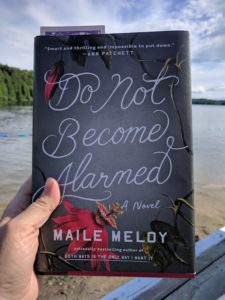 Next I read Do Not Become Alarmed, by Maile Maloy (also from Curiosity House Books in Creemore), whom I’d never read before, but I purchased the novel after reading Ann Patchett’s endorsement. In her back-of-the-book blurb, Patchett writes that this is the kind of novel you will barrel through and then should go back and re-read to realize how technically brilliant it is. Not quite sure I’ll be doing the latter, but this is a 300+page book that I read in less than a day. Also about a body of water, this one being an alligator-infested river in Panama in which a group of American children are floating in inner-tubes when they drift away from their errant parents. The American children are on a cruise with their families and they’ve just embarked from an excursion, and it’s all gone a bit wrong, and it’s only going to get worse. The story is indeed fast-paced and enthralling, and there were a few moments where the prose and what was happening took my breath away. This is a book about privilege, naivety, stupidity, and the ways in which Americans (and their ilk—hi! [waves]) are able to go about their lives protected from the risks and dangers that are commonplace in so many other countries.
Next I read Do Not Become Alarmed, by Maile Maloy (also from Curiosity House Books in Creemore), whom I’d never read before, but I purchased the novel after reading Ann Patchett’s endorsement. In her back-of-the-book blurb, Patchett writes that this is the kind of novel you will barrel through and then should go back and re-read to realize how technically brilliant it is. Not quite sure I’ll be doing the latter, but this is a 300+page book that I read in less than a day. Also about a body of water, this one being an alligator-infested river in Panama in which a group of American children are floating in inner-tubes when they drift away from their errant parents. The American children are on a cruise with their families and they’ve just embarked from an excursion, and it’s all gone a bit wrong, and it’s only going to get worse. The story is indeed fast-paced and enthralling, and there were a few moments where the prose and what was happening took my breath away. This is a book about privilege, naivety, stupidity, and the ways in which Americans (and their ilk—hi! [waves]) are able to go about their lives protected from the risks and dangers that are commonplace in so many other countries.
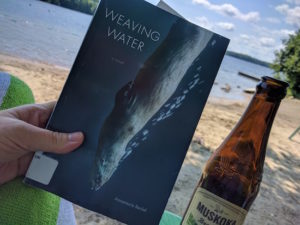 Next up was Weaving Water, by Annamarie Beckel, which was a book I’d been interested in for Annie Dillard Tinker Creek reasons, and then picked up to read after I met Annamarie at the Lakefield Literary Festival. In this book, the body of water in question is a pond in Newfoundland—and the novel points out that “ponds” in Newfoundland can often be the size of large lakes. On the banks of the pond is an old cabin that belonged to Beth Meyer’s husband’s great-aunt, who left it to them after she died. An ecologist by training and on the cusp of a new stage in life now that her daughter has gone away to school, Beth moves out to the remote cabin to do research on river otters, looking for answers to save an earth in peril. She meets her eccentric neighbour with an unshakable belief in ghosts and magic, and her neighbour’s nephew who Beth is drawn to in spite of herself. It turns out the answers Beth is looking for are not just about river otters after all, but the creatures remain at the centre of the novel and Beckel’s wonder at their habits and mysteries are absolutely palpable.
Next up was Weaving Water, by Annamarie Beckel, which was a book I’d been interested in for Annie Dillard Tinker Creek reasons, and then picked up to read after I met Annamarie at the Lakefield Literary Festival. In this book, the body of water in question is a pond in Newfoundland—and the novel points out that “ponds” in Newfoundland can often be the size of large lakes. On the banks of the pond is an old cabin that belonged to Beth Meyer’s husband’s great-aunt, who left it to them after she died. An ecologist by training and on the cusp of a new stage in life now that her daughter has gone away to school, Beth moves out to the remote cabin to do research on river otters, looking for answers to save an earth in peril. She meets her eccentric neighbour with an unshakable belief in ghosts and magic, and her neighbour’s nephew who Beth is drawn to in spite of herself. It turns out the answers Beth is looking for are not just about river otters after all, but the creatures remain at the centre of the novel and Beckel’s wonder at their habits and mysteries are absolutely palpable.
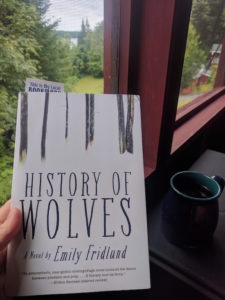 It took me a while to know that Emily Fridlund’s A History of Wolves (which I bought at Lighthouse Books in Brighton the weekend we were camping) would really work. There’s something off-putting about it, and it takes time to realize that that off-puttingness is part of its very design. Ostensibly, it fits right in with all the other books, with the body of water even—the lake the narrator lives on with her parents at their abandoned commune, isolated in the woods of northern Minnesota. But then a couple moves into a new cabin across the lake, and she can watches them through their windows, and begins to care for their young son. And she’s drawn to the family in a way that’s connected with a former teacher who was eventually charged with possession of child p*rnography, and a classmate who’d been connected to him. How do all the pieces fit together? To be honest, I’m still not entirely sure and it’s the kind of book I should return to and I’m even compelled to, but am not sure I will. Because of the off-puttingness, a narrator who never really connects to anyone. Again, which is the point, and there’s a killer last line that underlines this point. I ended up really appreciating this book, though I can’t say I liked it. But in the end, it was a perfect fit with all the rest, the splash of the paddle from Linda’s canoe as she makes her way across the lake.
It took me a while to know that Emily Fridlund’s A History of Wolves (which I bought at Lighthouse Books in Brighton the weekend we were camping) would really work. There’s something off-putting about it, and it takes time to realize that that off-puttingness is part of its very design. Ostensibly, it fits right in with all the other books, with the body of water even—the lake the narrator lives on with her parents at their abandoned commune, isolated in the woods of northern Minnesota. But then a couple moves into a new cabin across the lake, and she can watches them through their windows, and begins to care for their young son. And she’s drawn to the family in a way that’s connected with a former teacher who was eventually charged with possession of child p*rnography, and a classmate who’d been connected to him. How do all the pieces fit together? To be honest, I’m still not entirely sure and it’s the kind of book I should return to and I’m even compelled to, but am not sure I will. Because of the off-puttingness, a narrator who never really connects to anyone. Again, which is the point, and there’s a killer last line that underlines this point. I ended up really appreciating this book, though I can’t say I liked it. But in the end, it was a perfect fit with all the rest, the splash of the paddle from Linda’s canoe as she makes her way across the lake.
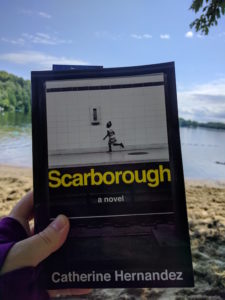 I wasn’t sure how Scarborough, by Catherine Hernandez (which I bought on our trip to Mabel’s Fables a few weeks back), would fit in with all the rest, a book that is so urban. But then it turned out to have its own body of water, the Rouge River, and the book opens with a heron at the river’s mouth, and it moves through the seasons in the same way Lee’s Turning did. I loved this novel, which had been recommended by loads of people and which I read in less than a day. At the centre of the story is a drop-in centre at a Scarborough elementary school where families turn up for company, support…and breakfast. We see the program coordinator’s communications with her supervisor and the way that bureaucratic requirements (and racism) keep the program from properly serving the people it’s meant to. There are failings and there is tragedy, but there is also resilience and connection. Scarborough has just been nominated for a Toronto Book Award and I’m thrilled about that.
I wasn’t sure how Scarborough, by Catherine Hernandez (which I bought on our trip to Mabel’s Fables a few weeks back), would fit in with all the rest, a book that is so urban. But then it turned out to have its own body of water, the Rouge River, and the book opens with a heron at the river’s mouth, and it moves through the seasons in the same way Lee’s Turning did. I loved this novel, which had been recommended by loads of people and which I read in less than a day. At the centre of the story is a drop-in centre at a Scarborough elementary school where families turn up for company, support…and breakfast. We see the program coordinator’s communications with her supervisor and the way that bureaucratic requirements (and racism) keep the program from properly serving the people it’s meant to. There are failings and there is tragedy, but there is also resilience and connection. Scarborough has just been nominated for a Toronto Book Award and I’m thrilled about that.
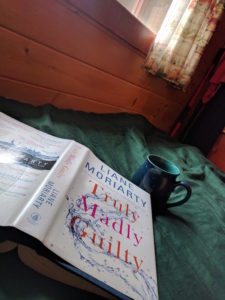 Next up was Lianne Moriarty’s Truly Madly Guilty, which I bought at Beggar’s Banquet Books in Gananoque when I was there in early May. I loved her Big Little Lies back in March, and remember hearing about this one when it came out last year but then didn’t read it after coming across a dismissive review—I think there was a big reveal that was meant to be anti-climatic in the end. But I’m so glad I finally picked it up. Moriarty is brilliant, and will never get the literary credit she deserves for sexist reasons. Indeed, this is a novel that revolves around a mystery—something happened at a bbq and the novel moves between the perspectives of different characters reflecting on the events leading up to it. At the centre of the book is two friends, Clementine and Erica, friends since childhood with a complicated dynamic. And Moriarty gets it so perfectly, the way that a friendship can come with ambivalence and animosity, and she ties it to the women’s marriages and their relationships to their mothers. The reviewer is correct that the big reveal is less than we’ve been lead to believe it’s going to be—but it doesn’t matter because the point of the book turns out to be so much bigger than what happened one night. And that’s what’s so fantastic about it, the hugeness of this novel’s scope—this event of one night ends up connecting to stories that are decades old and to characters far-flung and nearby. It reminded me of The Slap, by Christian Tsiolkas, but without the violence and misogyny. Moriarty manages to show every single character at their worst, but redeem them too in a way that’s entirely believable. And now I want to read every single thing she’s ever written. (PS: this was the one that didn’t quite click with all the others, but then there ended up being a body of water after all, which was a very tacky backyard fountain that meets with a sorry end.)
Next up was Lianne Moriarty’s Truly Madly Guilty, which I bought at Beggar’s Banquet Books in Gananoque when I was there in early May. I loved her Big Little Lies back in March, and remember hearing about this one when it came out last year but then didn’t read it after coming across a dismissive review—I think there was a big reveal that was meant to be anti-climatic in the end. But I’m so glad I finally picked it up. Moriarty is brilliant, and will never get the literary credit she deserves for sexist reasons. Indeed, this is a novel that revolves around a mystery—something happened at a bbq and the novel moves between the perspectives of different characters reflecting on the events leading up to it. At the centre of the book is two friends, Clementine and Erica, friends since childhood with a complicated dynamic. And Moriarty gets it so perfectly, the way that a friendship can come with ambivalence and animosity, and she ties it to the women’s marriages and their relationships to their mothers. The reviewer is correct that the big reveal is less than we’ve been lead to believe it’s going to be—but it doesn’t matter because the point of the book turns out to be so much bigger than what happened one night. And that’s what’s so fantastic about it, the hugeness of this novel’s scope—this event of one night ends up connecting to stories that are decades old and to characters far-flung and nearby. It reminded me of The Slap, by Christian Tsiolkas, but without the violence and misogyny. Moriarty manages to show every single character at their worst, but redeem them too in a way that’s entirely believable. And now I want to read every single thing she’s ever written. (PS: this was the one that didn’t quite click with all the others, but then there ended up being a body of water after all, which was a very tacky backyard fountain that meets with a sorry end.)
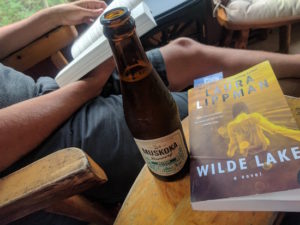 And next up to another woman writer who doesn’t get the credit for being as brilliant as she is, and that’s Laura Lippman—although she gets some credit. I’ve loved her work for years now, and was happy to read Wilde Lake, which I bought at Happenstance Books when I was there for the Lakefield Literary Festival. Stuart had already read it and couldn’t wait for me to finally get to it so we could talk about it. Loosely an homage to To Kill a Mockingbird, it’s about a newly elected State Attorney in Howard County, Maryland, who’s following in her revered father’s footsteps. When Lu’s first big murder case surprisingly hearkens back to events during the summer of 1980 during which her big-shot brother was involved in an altercation where somebody turned up dead, all kinds of long-forgotten secrets are brought up to the surface. This is a novel about rape culture, and the ways in which changes in the law have influenced how rapes are prosecuted, and it’s about fallibility, family secrets, and lost ideals, and I thought about it for days and days afterwards. It’s full of twists and surprises, and the most evocatively depicted small town, built around a lake, of course. It’s really an extraordinarily good novel.
And next up to another woman writer who doesn’t get the credit for being as brilliant as she is, and that’s Laura Lippman—although she gets some credit. I’ve loved her work for years now, and was happy to read Wilde Lake, which I bought at Happenstance Books when I was there for the Lakefield Literary Festival. Stuart had already read it and couldn’t wait for me to finally get to it so we could talk about it. Loosely an homage to To Kill a Mockingbird, it’s about a newly elected State Attorney in Howard County, Maryland, who’s following in her revered father’s footsteps. When Lu’s first big murder case surprisingly hearkens back to events during the summer of 1980 during which her big-shot brother was involved in an altercation where somebody turned up dead, all kinds of long-forgotten secrets are brought up to the surface. This is a novel about rape culture, and the ways in which changes in the law have influenced how rapes are prosecuted, and it’s about fallibility, family secrets, and lost ideals, and I thought about it for days and days afterwards. It’s full of twists and surprises, and the most evocatively depicted small town, built around a lake, of course. It’s really an extraordinarily good novel.
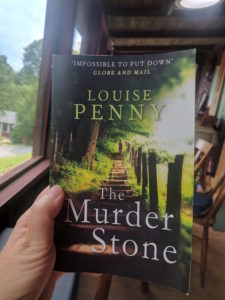 And then it was Friday and we were heading home the next day and the other book we’d bought was Bear Town, but Stuart was in the middle of it. And so I went to check out the library at the resort we were staying at, and was pleased to discover The Murder Stone, by Louise Penny (which was the UK title, published in Canada as A Rule Against Murder), which I haven’t read yet. (I came to Penny’s Three Pines series late with A Trick of the Light.) It was absolutely perfect to read because it was set at a place much like the place where were staying (albeit much much more fancy!) and as I was reading the part in the book where there was a huge storm with thunder and lightning, we were having the exact same weather and the lightning kept illuminating our little cabin just like daylight, and it was all a little too close to home.
And then it was Friday and we were heading home the next day and the other book we’d bought was Bear Town, but Stuart was in the middle of it. And so I went to check out the library at the resort we were staying at, and was pleased to discover The Murder Stone, by Louise Penny (which was the UK title, published in Canada as A Rule Against Murder), which I haven’t read yet. (I came to Penny’s Three Pines series late with A Trick of the Light.) It was absolutely perfect to read because it was set at a place much like the place where were staying (albeit much much more fancy!) and as I was reading the part in the book where there was a huge storm with thunder and lightning, we were having the exact same weather and the lightning kept illuminating our little cabin just like daylight, and it was all a little too close to home.
August 3, 2017
The Summer Book
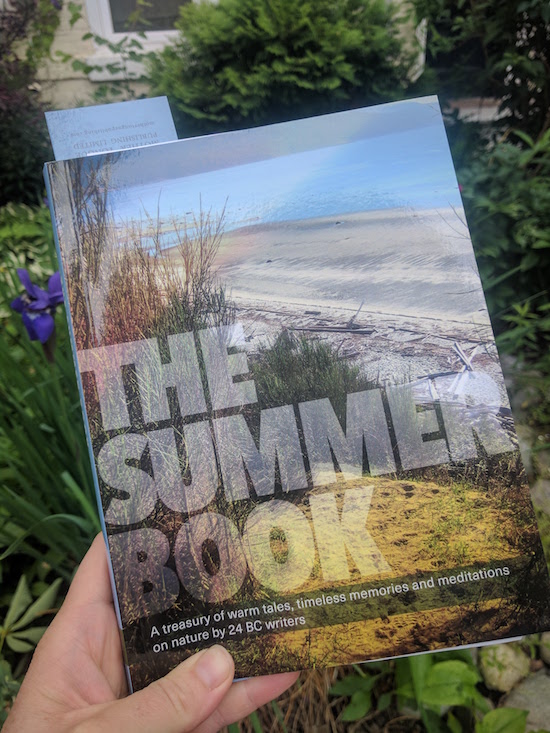
I finished The Summer Book this other night, an anthology of non-fiction from BC writers that has proven such a delight and travelled me all the way from June to the end of July. The collection opens with Theresa Kishkan’s stunning essay, “Love Song,” which you can read here, an essay that articulates the magic of summer and all its strange tricks of time and light. I also loved pieces by Eve Joseph (“My memories of summer have as much to do with longing as they do with summer itself….”), Fiona Tinwei Lam on her childhood home and her family’s backyard pool, and other stories of summer love, summer cusps (see Sarah de Leeuw on the summer that began the end of childhood) and summer heartache. Luanne Armstrong’s Summer Break which so perfectly articulates the awful fleetingness of summertime: “I am caught between the beach and the future, between time and no time…” She writes about “how to cope or understand or even live with the world in such a state of frightening fragmentation where there is both the paradisial beach and the black muck of ‘news.'” And goes on, “Fortunately for me, the mountains and lake don’t care… Every day, I walk on the mountains, down to the beach, up through the trees, watching, noticing.” It’s summertime, and the living is complicated. But a book like this gives its reader a similar effect.
August 2, 2017
Annie Muktuk and Other Stories, by Norma Dunning
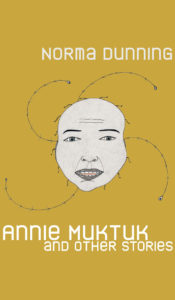 When I read the article, “What inspired her was getting mad,” about the story behind Norma Dunning’s debut collection, Annie Mukluk and Other Stories, I was not surprised. Acts of justice and revenge factor throughout the book, propelling the stories so terrifically. Dunning wrote her stories in response to ethnographic representations of Inuit people that neglected to show them as actual people, and the result is a book that’s really extraordinary. Because her people are so real, people who laugh, and joke, and drink, and have sex (and they have a lot of sex). Her characters love each other fiercely, family ties are nurtured in spite of obstacles (including residential schools and their legacy) and they all have a great deal of fun playing with the ignorance of the qallunaaq (Anglo-Canadian) and their perceptions of the north.
When I read the article, “What inspired her was getting mad,” about the story behind Norma Dunning’s debut collection, Annie Mukluk and Other Stories, I was not surprised. Acts of justice and revenge factor throughout the book, propelling the stories so terrifically. Dunning wrote her stories in response to ethnographic representations of Inuit people that neglected to show them as actual people, and the result is a book that’s really extraordinary. Because her people are so real, people who laugh, and joke, and drink, and have sex (and they have a lot of sex). Her characters love each other fiercely, family ties are nurtured in spite of obstacles (including residential schools and their legacy) and they all have a great deal of fun playing with the ignorance of the qallunaaq (Anglo-Canadian) and their perceptions of the north.
In “The Road Show Eskimo,” an elderly Inuit woman who found fame as the apparent author of a book about her experiences in the South—except the book was a fraud and it had been written by her white ex-husband—makes money from this endeavour and she even relishes the role she has to play to conform to peoples’ expectations. But on the particular day depicted in this story, the woman is going to take back her identity and use the power she’s been holding all along.
Such power also factors in the story “Husky,” about a HBC Agent who brings his three Inuit wives to Winnipeg where they are all made victims of violent racism—until they aren’t anymore, and the women take matters into their hands in the most fantastic feat of justice.
I loved “Elipsee,” about a man who’s taking his beloved wife out on the land one more time—she’s dying of cancer and this is the one thing left to try, and it actually works, in a beautiful, sad and perfect way, as the couple reconnects with their own history and that of their ancestors. In “Kakoot,” an Inuit man at the end of his life tries to leave this world for the next, which is complicated when you life in an old age home in the south and the spirit of your land and people are hard to come by.
And “Annie Muktuk” is the gorgeous story of two friends, one of whom has fallen in love with the titular character, described as follows:
“What I couldn’t get into Moses Henry’s head was that she just wasn’t Annie Mukluk. She was bipolar. She liked the Arctic and the Antarctic. She played with penguins and the polar bears. Annie Mukluk liked to fuck and she did it with everyone in Igloolik and everywhere else she went. She’d fuck your father, your sister, all your brothers and finish off with your mother. She swung both ways and sideways.”
(This paragraph joins the one about Slutty Marie from Megan Gail Coles’ Eating Habits… as perhaps two of my favourite paragraphs about women with voracious sexual appetites in all of Canadian literature.)
Anyway, the two friends, Moses Henry and Johnny Cochrane are each puzzling out the ways forward in their lives, in a fantastic, ferocious and bawdy novella about love, and brotherhood and friendship. I loved it. In “My Sisters and I,” three amazing women survive their experiences at residential school with their wits and strength, and the punch in the nose at the end of the story is the spectacular and perfectly delivered act of violence. This is justice, which is nice to encounter somewhere, even fictionally, because there’s certainly not much of it in reality. But these kinds of representations of Inuit women are just the beginning…
August 2, 2017
Other Words, Other Summers
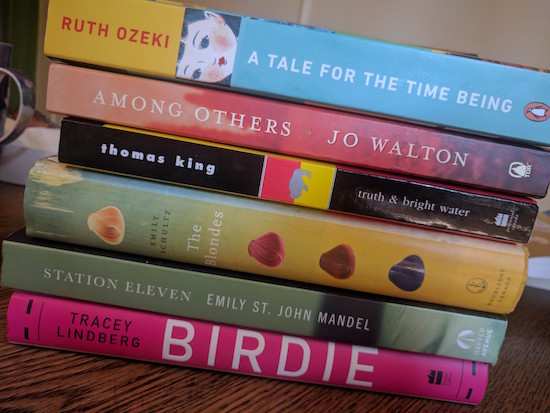
On my CBC Ontario Morning column this morning, my theme was other worlds and other summers, spectacular transporting books you might have missed the first time around which are so timeless that it will never be too late to go back to them. Like this weekend, maybe? You can listen again on the podcast here. I come in at 38.4 minutes.
August 1, 2017
Camping With Louise Penny
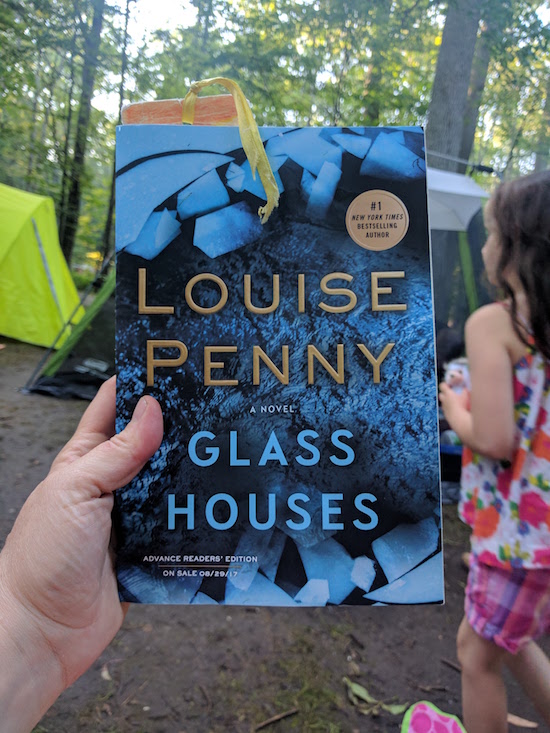
I have developed a hammock habit over the last few years, and most lazy summer afternoons you’ll find me in my urban backyard enjoying a warm breeze and basking in the shade of our enormous silver maple. Reading, obviously. And the best thing about a hammock habit is that it can be altogether portable if you’ve got the right hammock, which I do, complete with a foldable frame and a carrying bag. It is the heaviest most awkward portable object imaginable, but it’s mine, and it’s the most essential item in our mountain of equipment when we’re packing the car to go camping.
We’re not natural campers, my family. I’m a bad Canadian and my husband is an immigrant, and so camping (along with ice skating) is an activity we’ve had to work hard to fall in love with—mostly for the sake of the children. But because camping doesn’t involve falling all over perilous slippery surfaces while wearing blades on our shoes, we’ve actually had some luck with this. This summer will be our fourth year pitching a tent out in the wilderness—or rather, more realistically, while my husband is busy pitching the tent, I’ll be setting up my hammock.
The hammock itself is not the only ingredient necessary for a successful camping weekend, however. We need bug spray, and sleeping pads, fire-starters and marshmallows, and we need books. And not just any books. For me, I’ve learned that a weekend camping in the woods is not completely unless I’ve got a big fat Louise Penny novel to be absorbed in. The hammock would be wasted without it.
Miles from the cozy civilization invoked by the fictional Three Pines, with its bistro, B&B, boulangerie and bookshop, I spend our camping afternoons in my hammock wholly wrapt by Penny’s novels, compelled by her character, Chief Inspector Armand Gamache and his call to duty. There will be some sort of crime, either immediately or eventually a murder, and any gruesomeness related to this matter will be abated by the scenes Penny sets in Three Pines, a place as familiar to me as my own neighbourhood is. I pick up these books in anticipation of returning to Three Pines, and to its people, who are complicated, irreverent, brilliant, warm and funny. And there, in the middle of the woods in Ontario, insects buzzing about and sunshine peeking in through the canopy of tall skinny pine trees, there I’ll be.
You can almost smell the croissants warm from the oven, which is saying something, when a fictional redolence can overpower the actual smell of outhouse.
(We had an amazing, albeit bug-infested, camping trip this weekend. Lucky me, I had an ARC of Louise Penny’s new novel Glass Houses in hand. You can see more photos on my Instagram.)
July 27, 2017
Feast: An Edible Road Trip
If might surprise some people to find that I have blogging advice beyond “Blog like nobody’s reading (because often nobody is)” but if you’ve been reading carefully you will also know that I’m a firm believer that a blog needs room to grow and space to wander. And Lindsay Anderson and Dana VanVeller must have known this too when they began their blogging endeavour a few years ago because they gave themselves an entire nation to wander through. Their blog was called An Edible Road Trip and chronicled their adventures (and misadventures) eating across Canada to discover a culinary culture “beyond Kraft Dinner, poutine, Nanaimo Bars, and butter tarts.”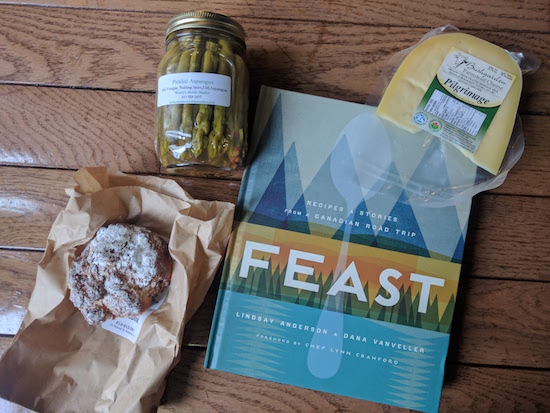
One of the highlights of my spring and book promotion has been travelling to (and eating in!) different places I haven’t spent much time in before. My blueberry scone at the Hamilton Farmers’ Market was legendary, and then the mind-blowing dinner we had in Waterloo as part of the Appetite for Reading Book Club. And it was in Gananoque at the 1000 Islands Writers Festival where I met up with the women behind Feast, the book that grew out of the edible road trip. The book was already on my radar because of the story behind it and also its beautiful design (and you can read their very cool blog post, “Anatomy of a Cookbook Cover”, here). And then I got to listen to their amazing presentation about their journey across Canada and the people they met and the things they learned about—the farmer in the Yukon whose farm you need to travel to via two canoe rides was one anecdote that surprised me and stuck in my mind. Naturally, I bought the book—and their event was spectacularly catered with local farmers’ market fare and the whole thing was totally delicious. Feast, I figured, would be an excellent souvenir.
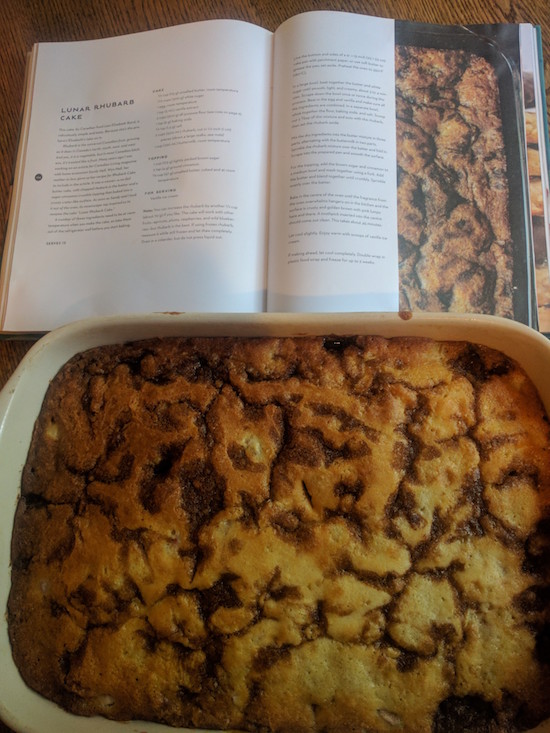
The whole idea behind it was a little bit abstract though, practically speaking. It was May by this point and therefore rhubarb season and I proceeded to bake the Lunar Rhubarb Cake (pictured above) at least three times before June. The recipe doesn’t skimp on sugar, and it won rave reviews at every table at which I served it… But still. A nice cookbook to have, but I wasn’t sure how often I was going to use it. And then we went away for a week in Nova Scotia…
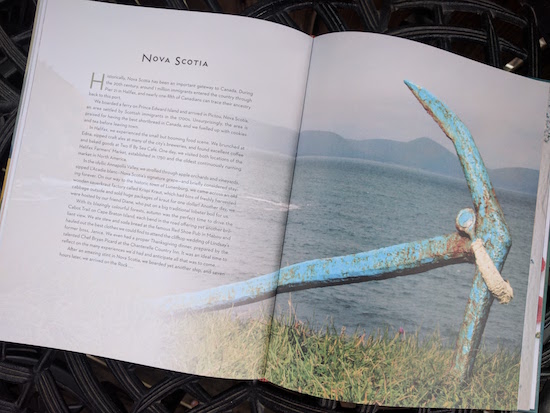
And then suddenly a whole bunch of recipes that had merely existed on the page for me before meant something altogether different. Upon coming home, I reread the Nova Scotia page and recognized all kinds of references and was reminded of the very good places we ate on our trip.
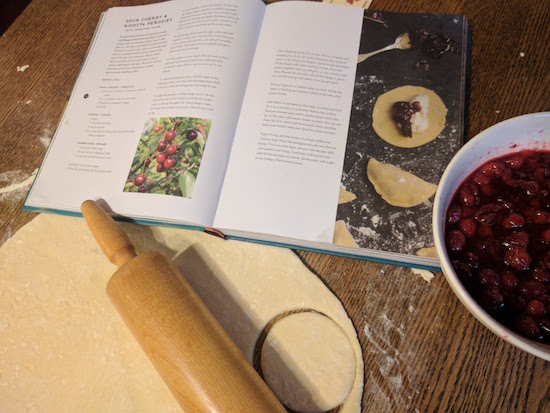
The first thing I made upon homecoming wasn’t from Nova Scotia at all, however, but instead the Sour Cherry Pierogi recipe from the prairies. I found sour cherries at a local green grocer and it sounded so delicious, and so I made them (with help from Stuart who was in charge of construction) and they were SO SO good. And then we got to use the leftover compote for porridge.
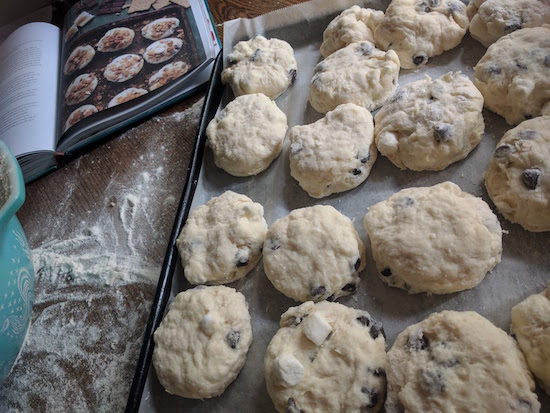
And I’d wanted to make the s’mores scones all along for reasons that should be altogether self-explanatory, but the mission took on a sense of urgency when I reread the recipe and learned it was from the chef at Two If By Sea, whose croissants were so delectable on our trip that we went to Dartmouth twice. So baking these scones was a little bit like a homecoming, even if for a place that wasn’t our home at all—but the food made it all so familiar.
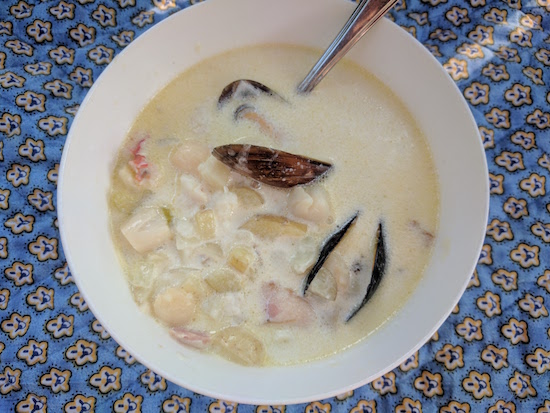
Which is why we made the seafood chowder the following Friday, even though chowder isn’t always the best thing you can be eating when it’s 36 degrees celsius, but we weren’t sorry. I’d got fresh fish at the grocery store that morning and even though it wasn’t the fresh fish we’d become accustomed to (Stuart ate scallops in Lunenberg that he might never get over—in a good way) it was incredibly delicious and made us miss Nova Scotia a little less. And we’ve still got the oatcakes to make, and a few other Atlantic items to try.
And then after that? Well, between the book and our trip, we’ve never been so inspired to and travel to another new part of the country. And in the meantime we’ll be cooking from Feast because Canada is delicious.
July 25, 2017
The Ravines of Smeared Disarray
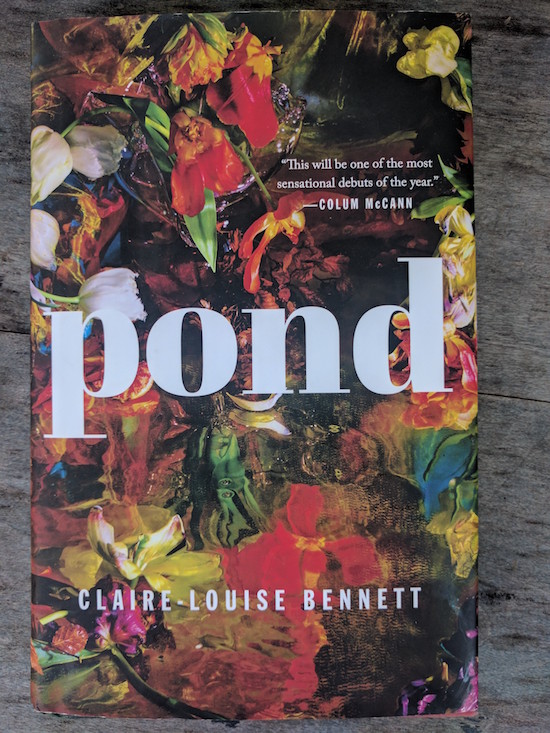
“English, strictly speaking, is not my first language by the way. I haven’t yet discovered what my first language is so for the time being I use English words in order to say things.”
Last week I got tired of narratives that were all too predictable, and so I decided to pick up Pond again, the little book with the gorgeous cover that has been shelved on my staircase since last August. My staircase is book limbo, the books that aren’t to be either shelved or given away. They’re the books I haven’t quite finished with yet, although there is a chance they could linger in unfinishedness in perpetuity. I bought Pond last summer after reading A.N. Devers’ review in which she makes connections from Woolf to Walden, and decrees the narrative as “muddy”:
“Muddiness is not typically a positive description for a narrative, but this mud is sparkling, full of mica and minerals that glitter with color when the sun’s rays hit. It’s through this glistening mud that Bennett’s readers get to mudlark, mucking about in prose that is alternatively deliberate and crisp, surrealistic and unknowable, to find real gems of observation and language.”
I recall that I liked the book well enough, but couldn’t remember any more about it. It hadn’t satisfied me. If it weren’t for the absolutely brilliant cover, to be honest, I might not have even read it all, let alone read it again. (The UK cover was completely unremarkable, not a bit of mica or mineral. It was also marketed as a short story collection there, but as a novel upon its US publication, which is interesting to consider, and also how different the two books must be regarded by different readers as a result of these things.) Anyway, I picked it up again, finally, and was quite delighted to discover inside a postcard I sent myself last summer, which seems sort of fitting with the book’s interiority, and then I got to use the postcard as a bookmark.
The book is curious and amusing, domestic minutia. Disorienting—nobody draws us a map here. The narrator lives in an old cottage on an estate near the coast of Ireland and in one of the stories a neighbour is having a wedding, for which the narrator gives them bunting. And that the narrator owns bunting at all seems kind of incongruous from what we know of her—when does she string her bunting ever—but she’s not telling us everything. In fact, it’s the telling she takes offence to. She is bothered by a sign that’s been put up beside the pond on the property, purportedly to stop children from toppling into it. A sign reading, unsurprisingly, POND: “As if the Earth were a colossal and elaborate deathtrap. How will I ever make myself at home here if there are always these meddlesome scaremongering signs everywhere I go.”
All of which is to say that nothing is labelled in Pond, and everything is mutable, in particular the line between indoors and out, home and away. It’s an uncanny narrative. The lines between then and now are blurry too, in this place so steeped in history, tiresomely so. The thatchers come to do the roofs, and everyone is very excited, but the narrator finds these workers offensive and disturbing. They bother her view. “A leaf came in through the window and dropped directly in the water between my knees as I sat in the bath looking out.”
So yes, I was thinking of Walden and Woolf, and the person who did Thoreau’s laundry, of course. But in the chapter titled “Control Knobs,” I started thinking about Barbara Pym. And about this is a book that contains all my favourite things, actually—jam and bunting—but in a kaleidoscopic fashion. The familiar made unfamiliar, of course, but still, one is home, in a readerly sense. The chapter is decidedly Pymmish in its fixation on ordinary details—the objects assembled in bowls on a window sill, for example, and how light shines through a jar—that are standing in for something deeper, darker and more resonant. Bennett writes, “There are a number of regions in any abode that are foremost yet unreachable. Places, in other words, right under your nose, which are routinely inundated with crumbs and smidgens and remains. And ill-suited specks and veils and hairpins stay still and conspire in a way that is unpleasant to consider, and so one largely attempts to arrange one’s awareness upon the immediate surfaces always and not let it drop into the ravines of smeared disarray everywhere between things….”
This is the chapter where the narrator is referring to the knobs on her stove, which is not a proper stove, but a kind of hotplate one finds in a bedsit, “the two-ring ovens [that] are synonymous with bedsits… One thinks of unmarried people right away, bereft secretaries and threadbare caretakers, and of ironing boards with scorched striped covers standing next to the airing-cupboard door at the end of the hallway.” And then she takes it darker, suggesting that part of its design as an implement for people who live alone in small spaces isn’t just about space considerations, but that one couldn’t kill oneself with such a device, if it came to that. “I certainly couldn’t get my head into my cooker without getting a lot of grease on the underside of my chin for example—and it stinks in there.” Even suicide—as are most things for this narrator—is a matter of practicality.
Strange as though her point of view might be, Pond’s narrator is a sensible woman, preoccupied by compost, which she is meant to empty often, but there isn’t time for that, and so it piles up. She is aware of decay is what I meant, (and of course there is the leaf through the window—this idyl is not perpetual spring), and the bowl gets empties, or else it doesn’t. She refuses to be pinned down. As might be the case in a novel that used to be a collection of short stories, this narrator contains multitudes. “The postbox gets damp, you see, causing letters or so to pucker and leak, so occasionally I am quite diligent about emptying it and other times my mind is such that I just don’t care enough about what happens to other people’s post.” (Do you love that???)
This woman is alone, and unabashed about being not understood, but she is all right. She is nutty, but she had friends, and parties, and lovers. People stop by and sit on her step for a chat, and she has a pot of parsley growing in soil there, though don’t take that to mean she has a propensity for growing things—she bought it sprouted from a nearby supermarket where it was packed in a plastic carton. She isn’t lonely. She has free time, it seems, but “there are always things that must be done.” Check the postbox, sweep the dust out—because the outside keeps on coming in. And she has one of those doors that open in half, after all, so this is inevitable. The home is not apart from the world, but part of it, and therefore the things we do to care for our homes is work of the world as well. The things you could write about a kitchen hearth are as profound as thoughts about a (Walden) POND just say. It makes me think about doorsteps, and thresholds, and the liminal, and sublime.
Strange and surreal too. I’m still not done with it. I’m feeling like Pond might be going back on the stairs, for another day down the road when I want to read a postcard to myself and to have the ordinary and obvious quite complicated. Like housework, it’s a task that will never be finished, a work-in-progress, the stuff of life.
July 24, 2017
Lost Umbrella Empathy
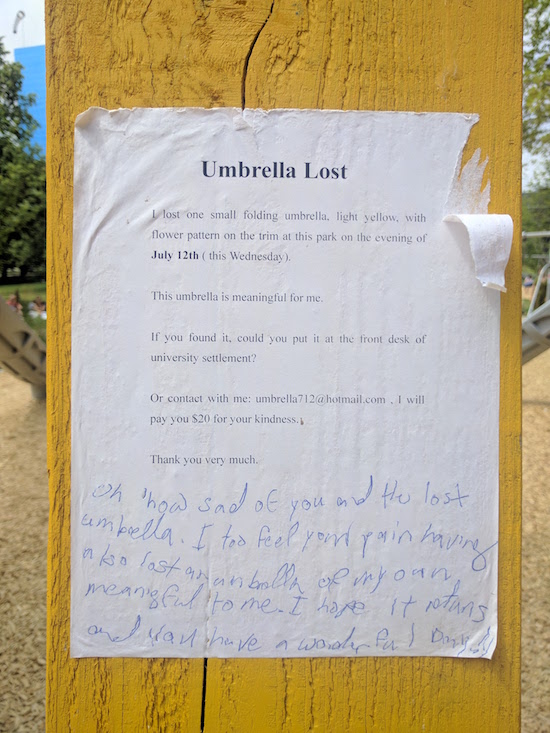
Avid readers here at Pickle Me This will remember that I’ve been keeping track of lost umbrellas in literature for some time now, whose authors have included EM Forster, Virginia Woolf, Cordelia Strube, Barbara Pym, and more. I think the sign I saw in a park yesterday counts as literature, don’t you? Particularly the line, “The umbrella is meaningful to me.” I know all about it; I’ve had many a meaningful umbrella in my time. Clearly I’m not the only one, as the sign’s response makes clear. Umbrella empathy, it seems, is endemic. Oh, I do hope her umbrella will be all right…
July 21, 2017
Mitzi Bytes in the World
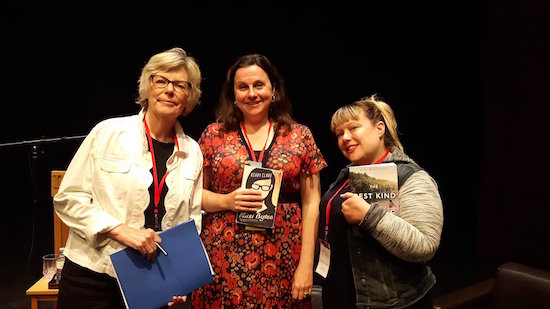
A thing I never had sufficient appreciation for before I became an author is the the work of literary festival volunteers. I’ve attended festivals as a reader, and always had the general impression that these were the kind of events that just kind of happened. But this spring I’ve learned that they only happen because a lot of people work really tirelessly to make it so, and this was definitely the case at the Lakefield Literary Festival last weekend, which was such a pleasure and an honour to be a part of. Having grown up down the highway from Lakefield, the festival has always been on my radar, and then to be invited for an event with Zoe Whittall and Marni Jackson, whose books I enjoyed so much last summer, was utterly fantastic.
Our event was such a pleasure, and I think it wasn’t just me who enjoyed it—you can read about it here. On Saturday morning I taught a session of my blogging workshop, which was made so excellent for me by the engaged and interesting people who’d signed up to be part of it. And while that was happening, my husband and children were enjoying the children’s events. Later that day we’d all head back to the festival for the reception, with delicious food and a perfect ambiance. There were other great events going on all weekend, and we enjoyed our time at the festival so much.
In other news, the Mitzi Bytes e-book (at Kobo or Kindle) is on sale right now for 4.99 as part of Savvy Reader’s 50 Book Pledge Deal. The lovely Theresa Kishkan wrote about how Virginia Woolf haunts its pages in a gorgeous post about summer reading. And I was so happy to see the book reviewed in the Tri-City News as part of a round-up of summer reads, along with a spread of other books that I’ve thoroughly enjoyed in this past while. Librarian Kathy Johnson writes, “This is a dishy and modern Harriet the Spy for an adult audience.”
